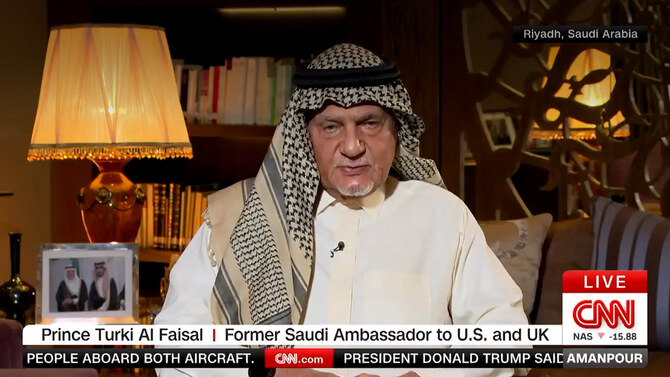LONDON: Donald Trump’s plan for the US to take control of Gaza and force Palestinians to leave the enclave would be “ethnic cleansing” that would spark conflict and bloodshed, Prince Turki Al-Faisal, Saudi Arabia’s former ambassador in Washington, said on Wednesday.
In an interview with CNN, Prince Turki, who is also a former head of the Kingdom’s intelligence services, angrily rejected the US president’s comments, which included a threat to send US troops to help turn Gaza into the “Riviera of the Middle East.”
Prince Turki said he expected Arab and Muslim countries, along with other nations and Europe, to take up the issue at the UN to show that the world opposed “this mad ethnic cleansing plan.”
“It is a fantasy to think that ethnic cleansing in the 21st century can be condoned by a world community that stays on its behind, and does not respond to that,” Prince Turki told presenter Christiane Amanpour. “The problem in Palestine is not the Palestinians. It is the Israeli occupation. And this has been clear and understood by everybody.”
Prince Turki said Trump’s comments upended previous US policy that favored a two-state solution based on land for peace.
He said Trump’s plan was based on the position of Israeli extremist politician Itamar Ben-Gvir, “the ultimate ethnic cleanser,” who recently resigned as national security minister over the Gaza ceasefire.
Trump’s words were a “total acceptance of the Israeli position by the American government,” Prince Turki said, adding that this approach had been gaining support in US political circles over the past two years.
Prince Turki said that if Trump visited Saudi Arabia, he is likely to receive “an earful” from the Saudi leadership about “not just the wisdom of what he is proposing, but the downright unfairness and injustice.”
Trump has had close relations with Saudi Arabia and made the Kingdom his first foreign visit during his first term. Prince Turki said Crown Prince Mohammed bin Salman had pledged last month to invest $600 billion in the US.
Saudi Arabia’s foreign ministry strongly condemned threats to displace Palestinians from their land and reiterated the Kingdom’s position that there would be no normalization of relations with Israel until the establishment of an independent Palestinian state with East Jerusalem as its capital.
“This has been the position of Saudi Arabia from the beginning,” Prince Turki said.
He said that Trump’s Gaza plan on top of the “destruction and the devastation” of the territory during Israel’s campaign would only lead to more support for militant groups such as Hamas.
“Everybody has been telling the Israelis that if you repress these people, that if you punish them, if you inflict death and destruction and mayhem and genocide on them, all you are going to do is create more opposition,” Prince Turki said.
“That’s why they want to use ethnic cleansing to get the people out of the territory.
“So, their policy is clear cut and, unfortunately, we hear this reflected now in what Mr. Trump has said.”



























